
Eurythmics were a British pop duo formed in 1980, consisting of Scottish vocalist Annie Lennox and English musician and producer Dave Stewart. They were both previously in the Tourists, a band that broke up in 1980. They released their first studio album, In the Garden, in 1981 to little success, but achieved global acclaim with their second album, Sweet Dreams (1983). The title track became a worldwide hit, reaching number two in the UK Singles Chart, and number one in Canada and the US Billboard Hot 100. Eurythmics went on to release a string of hit singles and albums, including "Love Is a Stranger", "There Must Be an Angel " and "Here Comes the Rain Again", before splitting in 1990.

1984 (For the Love of Big Brother) is a soundtrack album by the British pop duo Eurythmics. Released on 12 November 1984 by Virgin Records, it was the duo's fourth album overall and contains music recorded by Eurythmics for the film Nineteen Eighty-Four, based on George Orwell's dystopian novel of the same name. Virgin Films produced the film for release in its namesake year, and commissioned Eurythmics to compose a soundtrack.
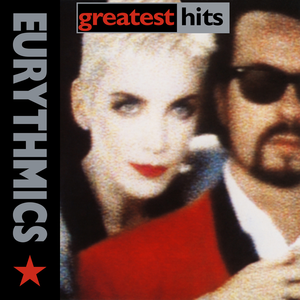
Greatest Hits is a greatest hits album by British pop duo Eurythmics, released on 18 March 1991 by RCA Records. It contains their successful singles spanning the years 1982 through 1990. The album topped the charts in the United Kingdom for a total of 10 weeks, in New Zealand for eight weeks and in Australia for seven weeks. It remains the duo's best-selling album worldwide and has been certified six-times platinum in the United Kingdom and triple platinum in the United States. Phil Sutcliffe in Q Magazine noted that "this compilation portrays, for once, a band accorded precise justice by the singles charts".

Ultimate Collection is the second greatest hits album by British pop duo Eurythmics, released on 7 November 2005 by RCA Records. This set preceded the reissue of all eight Eurythmics back-catalogue albums originally released by RCA Records. These reissues include remastered tracks and bonus material. The fact that the Ultimate Collection was closely connected to these reissues is also the chief reason for the omission of "Sexcrime ". While that song peaked at number four in the United Kingdom in 1984 and was later featured on the previous Greatest Hits album released in 1991, it is actually taken from the 1984 Virgin Records soundtrack album 1984 , Eurythmics' only album to date not to be released by RCA Records in the UK.

"Love Is a Stranger" is a song by the British pop duo Eurythmics. Originally released in late 1982, the single was commercially unsuccessful, but it was re-released in 1983, reaching the UK top 10. The single was re-released again in 1991, to promote Eurythmics' Greatest Hits album.

The discography of Eurythmics, a British rock/pop duo, consists of eight studio albums, one live album, two compilation albums, one soundtrack album, one extended play, and 33 singles. Their first studio album, In the Garden, was released in 1981 but they did not gain any commercial success until their second album, Sweet Dreams , released in 1983. The album reached number three in the UK and was certified platinum. The album's title track was released as a single, and reached #2 in the UK and #1 in the United States and Canada. Later in 1983, the duo released their third album, Touch. It topped the UK album chart, and produced three UK top 10 singles; "Who's That Girl?", "Right by Your Side", and "Here Comes the Rain Again".
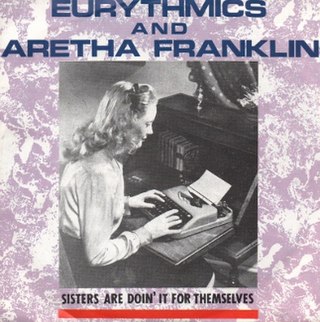
"Sisters Are Doin' It for Themselves" is a song by British pop duo Eurythmics and American singer Aretha Franklin. A modern feminist anthem, it was written by Eurythmics members Annie Lennox and David A. Stewart and featured on both Eurythmics' Be Yourself Tonight (1985) and Franklin's Who's Zoomin' Who? (1985) albums. The duo originally intended to perform with Tina Turner, who was unavailable at the time and so they flew to Detroit and recorded with Franklin instead. The track also features three of Tom Petty's Heartbreakers: Stan Lynch on drums, Benmont Tench on organ, and Mike Campbell on lead guitar, plus session bassist Nathan East.

"Sweet Dreams (Are Made of This)" is a song by British synth-pop duo Eurythmics. It was released as the fourth and final single from their second album of the same name in January 1983. It was their breakthrough hit, establishing the duo worldwide. It reached number two on the UK Singles Chart in March 1983, and number one on the US Billboard Hot 100 six months later; it was their first single released in the US.
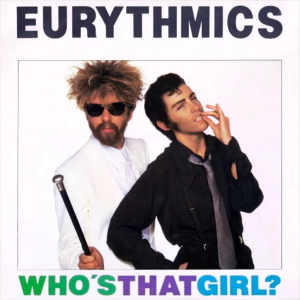
"Who's That Girl?" is a song by British pop duo Eurythmics, released as the lead single from their third studio album, Touch (1983). It was written by band members Annie Lennox and David A. Stewart and produced by Stewart.

"Right by Your Side" is a 1983 song by the British pop duo Eurythmics. It was written by group members Annie Lennox and David A. Stewart, and produced by Stewart. The track was released as the second single in the UK from Eurythmics' third album Touch.
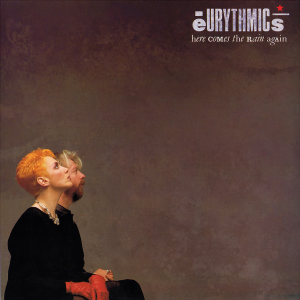
"Here Comes the Rain Again" is a 1983 song by British duo Eurythmics and the opening track from their third studio album Touch. It was written by group members Annie Lennox and David A. Stewart and produced by Stewart. The song was released on 12 January 1984 as the album's third single in the UK and in the United States as the first single.

"Julia" is a song performed by British pop duo Eurythmics. Written by group members Annie Lennox and David A. Stewart and produced by Stewart, the song was the second and final single released from their album 1984 , which served as the soundtrack to the film Nineteen Eighty-Four, an adaptation of George Orwell's political novel of the same name. It plays during the film's ending credits. The band were controversially chosen alongside the Dominic Muldowney orchestral composition.
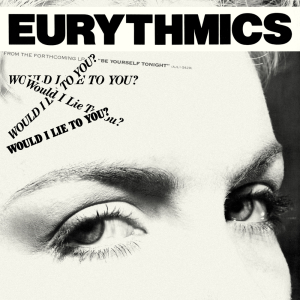
"Would I Lie to You?" is a song written and performed by British pop duo Eurythmics. Released on 9 April 1985 as the lead single from the band's fourth studio album, Be Yourself Tonight (1985), the song was the first by the duo to feature their change in musical direction from a predominantly synthpop style to rock and rhythm and blues. The song, and its accompanying album, featured a full backing band and relied less on electronic programming.
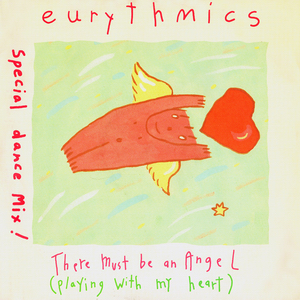
"There Must Be an Angel (Playing with My Heart)" is a song by the British musical duo Eurythmics, released as the second single from their fifth studio album, Be Yourself Tonight (1985). It features a harmonica solo by American musician Stevie Wonder. The song became a worldwide success; most notably in Ireland, Norway and the United Kingdom, where it remains the duo's only chart-topper.
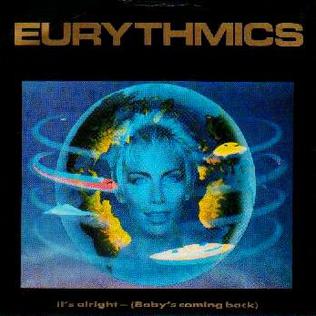
"It's Alright (Baby's Coming Back)" is a song written and recorded by the British pop music duo Eurythmics. It was released as the fourth and final single from their 1985 album Be Yourself Tonight. The song was produced by Dave Stewart, and the song's brass arrangement was devised by Michael Kamen.
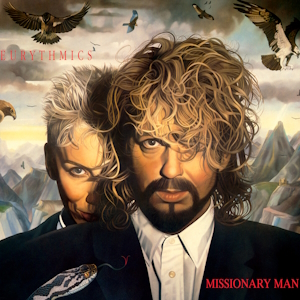
"Missionary Man" is a song by British pop duo Eurythmics from their fifth studio album, Revenge (1986). The song features Jimmy Zavala on harmonica and Joniece Jamison on backing vocals.

"Beethoven (I Love to Listen To)" is a song by British pop duo Eurythmics, released on 12 October 1987 as the lead single from their sixth studio album, Savage (1987).

"Don't Ask Me Why" is a song recorded by British pop music duo Eurythmics, released as the second single from their seventh album, We Too Are One (1989). The song was written by bandmembers Annie Lennox and David A. Stewart and produced by Stewart with Jimmy Iovine. In the US, it was released as the first single from the album. It is a lush pop song with melancholy and bitter lyrics which describe the ending of a love relationship. In it Lennox tells the subject "don't ask me why / I don't love you any more / I don't think I ever did".

"Dance Hall Days" is a song by the English new wave band Wang Chung. It was originally released as a single in 1982 when the band was called Huang Chung, then it was re-recorded and released a year later in 1983 for the studio album Points on the Curve. It was the band's only single to make the top 40 in the UK. In the US, it peaked at No. 16 on the Billboard Hot 100 and went to number one on the Dance Club Songs chart.

Nineteen Eighty-Four, also known as 1984, is a 1984 dystopian drama film written and directed by Michael Radford, based upon George Orwell's 1949 novel of the same name. Starring John Hurt, Richard Burton, Suzanna Hamilton, and Cyril Cusack, the film follows the life of Winston Smith (Hurt), a low-ranking civil servant in a war-torn London ruled by Oceania, a totalitarian superstate. Smith struggles to maintain his sanity and his grip on reality as the regime's overwhelming power and influence persecutes individualism and individual thinking on both a political and personal level.




















